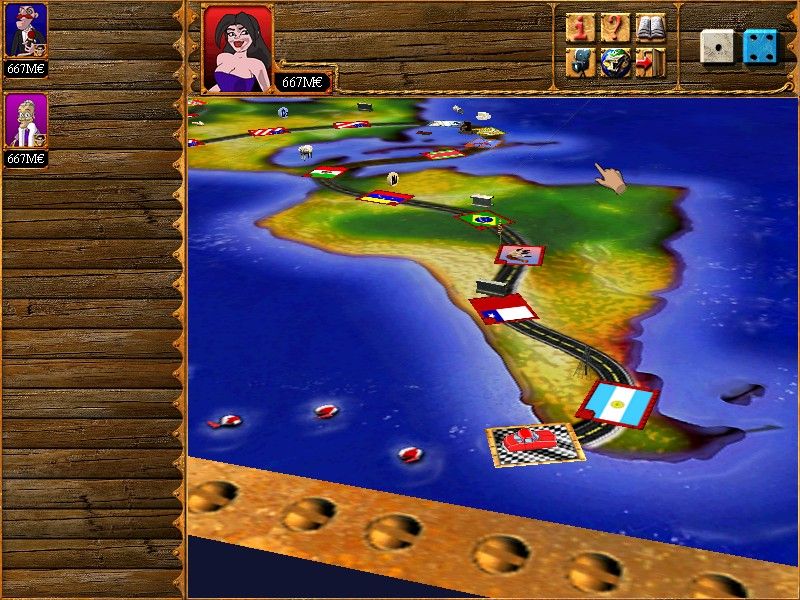Retro Replay Review
Gameplay
Money Mad faithfully adapts the classic board-game mechanics into a digital format, giving players the familiar thrill of rolling virtual dice and moving their tokens around a sprawling global map. From the outset, you’ll recognize the core loop: land on a space, follow its instructions, and build your financial empire. Yet where Monopoly confines you to a single city, Money Mad opens the entire world, creating vast new avenues for resource acquisition, industrial expansion, and tactical decisions.
(HEY YOU!! We hope you enjoy! We try not to run ads. So basically, this is a very expensive hobby running this site. Please consider joining us for updates, forums, and more. Network w/ us to make some cash or friends while retro gaming, and you can win some free retro games for posting. Okay, carry on 👍)
Players must purchase raw materials, construct factories, and manage supply chains on five continents, and each decision carries weight. Do you invest early in a high-risk oil refinery or diversify into agricultural holdings? Corporate events—ranging from tax hikes to shipping strikes—can appear at any moment, forcing you to adjust your strategy on the fly. This dynamic layer turns each dice roll into a potential pivot point, keeping the tension high even after hours of play.
For solo enthusiasts, the AI opponents bring varying difficulty levels and distinct playstyles. Some bots adopt aggressive profit-maximizing tactics, while others build conservative portfolios, offering a well-rounded challenge. In local or online multiplayer, up to six players can duke it out for supremacy, haggling over trades, forming temporary alliances, and sabotaging rivals with well-timed corporate cards. The social element is as rich as the economic one, making every match unique.
Speed controls and optional house rules allow for quick sessions or marathon board-game experiences. A fast-play mode truncates rounds and caps the property count, while the classic mode supports the full suite of industrial options—perfect for those who want the full “international mogul” fantasy. Overall, Money Mad’s gameplay delivers both accessible pick-up-and-play action and deep strategic choices for veteran tycoons.
Graphics
Visually, Money Mad opts for a clean, colorful presentation that balances readability and thematic flair. The world map is rendered in a stylized 3D perspective, with each territory clearly outlined and labeled. Icons for factories, resources, and company headquarters pop against the board’s muted background, making it easy to track your holdings at a glance.
Animations are subtle but effective: dice rolls bounce realistically on the table, property markers slide smoothly into place, and the camera zooms in to highlight major purchases or corporate events. These small touches lend a tactile sense to the digital board, reminding players of the physical experience while embracing the advantages of a video game adaptation.
User interface elements—menus, status panels, and tooltips—are intuitively arranged to minimize clutter. Hover over any space or asset, and a detailed info card appears, showing purchase price, income potential, and any special rules. Multiplayer chat and trading windows integrate seamlessly, ensuring that negotiations and banter don’t interrupt the flow of play.
While Money Mad doesn’t push the graphical envelope like high-budget AAA titles, its art style perfectly suits its strategy-board-game roots. The balance between functionality and visual charm ensures that even long sessions remain comfortable on the eyes, with custom colorblind palettes and adjustable font sizes enhancing accessibility.
Story
Money Mad doesn’t follow a linear narrative in the traditional sense—instead, it weaves emergent stories from players’ economic rivalries. Each match becomes a self-contained tale of ambition, cunning deals, and dramatic bankruptcies. You might start as a small regional investor and, through shrewd trades and market timing, ascend to global dominance—or crash to ruin under the weight of overexpansion.
The world-wide setting serves as a loose framing device rather than a scripted campaign. Corporate event cards occasionally inject thematic flavor—oil embargoes in the Middle East, tech booms in East Asia, or labor strikes in Europe—providing narrative beats that unfold differently every time. This approach keeps the focus on player agency, allowing you to craft your own saga of rise and fall.
Your opponents’ playstyles also shape the story. A rival who aggressively snaps up critical resources can force you into defensive maneuvers, setting up a dramatic comeback scenario when you seize a key territory. Conversely, a too-soft AI or timid human player can lead to a runaway leader story, which the game’s difficulty settings can mitigate by adjusting the economic volatility.
Although Money Mad lacks cutscenes or a defined protagonist, the rich strategic depth and world-spanning theme more than compensate. The narrative emerges organically from board dynamics, producing memorable “money wars” that players recount long after the final dice roll.
Overall Experience
Money Mad succeeds in translating the addictive qualities of its board-game predecessor into a polished digital package. The gameplay loop—rolling dice, acquiring assets, navigating corporate events—remains as satisfying as ever, while the expanded global map adds new layers of strategic depth. Whether you’re a casual gamer looking for a fun economic diversion or a hardcore strategist seeking endless replayability, you’ll find plenty to enjoy.
Multiplayer sessions, both local and online, elevate the experience, fostering negotiation, alliances, and rivalries that outshine most single-player board-game adaptations. The AI offers a capable substitute when friends aren’t available, though nothing quite matches the thrill of beating a human opponent in a high-stakes deal.
Performance is smooth even on modest hardware, and the adjustable ruleset caters to varying tastes and time constraints. While the lack of a traditional story campaign may disappoint players seeking a guided narrative, Money Mad’s emergent storytelling and thematic events deliver a compelling arc each session.
Overall, Money Mad is a robust, engaging adaptation that strikes an excellent balance between familiarity and fresh innovation. It’s a must-have for fans of economic board games and a solid recommendation for anyone seeking a deep, socially driven strategy experience on PC.
 Retro Replay Retro Replay gaming reviews, news, emulation, geek stuff and more!
Retro Replay Retro Replay gaming reviews, news, emulation, geek stuff and more!







Reviews
There are no reviews yet.